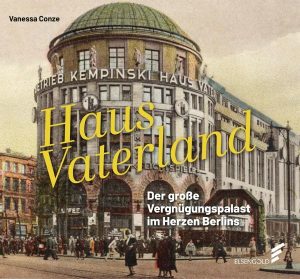Haus Vaterland
 Der legendäre Vergnügungstempel!Wer sich in Berlin amüsieren wollte, ging ins Haus Vaterland. Ende der 1920er- Jahre war das Haus Vaterland am Potsdamer Platz das wohl modernste Vergnügungsetablissement der Welt. Erstmals beschreibt die Historikerin Vanessa Conze das bunte Treiben, die verschiedenen Restaurants, Bars, Verkaufsausstellungen und die Personen, die hier die Nacht zum Tage machten.
Der legendäre Vergnügungstempel!Wer sich in Berlin amüsieren wollte, ging ins Haus Vaterland. Ende der 1920er- Jahre war das Haus Vaterland am Potsdamer Platz das wohl modernste Vergnügungsetablissement der Welt. Erstmals beschreibt die Historikerin Vanessa Conze das bunte Treiben, die verschiedenen Restaurants, Bars, Verkaufsausstellungen und die Personen, die hier die Nacht zum Tage machten.
Vanessa Conze schlägt einen weiten Bogen von Leo Kronau, dem Gründer des Hauses, die Familie Kempinski und die Begeisterung für technische Errungenschaften, für Kunst und Kitsch, über den langjährigen Direktor Richard Fleischer bis hin zur „Arisierung“ des Hauses 1933. Sie beleuchtet die Rolle des Hauses im Nationalsozialismus ebenso wie sein Ende im Bombenhagel und das Nachspiel der Ruine im Niemandsland zwischen Ost und West.
Autorin
Dr. habil. Vanessa Conze ist Privatdozentin an der Justus-Liebig-Universität Gießen.
Haus Vaterland
Autorin: Dr. habil. Vanessa Conze
144 Seiten, 100 Abb., gebunden
Format 22,5 X 24,5 cm
Elsengold
Euro 25,00 (D)
Euro 25,70 (A)
ISBN 978-3-96201-049-2


